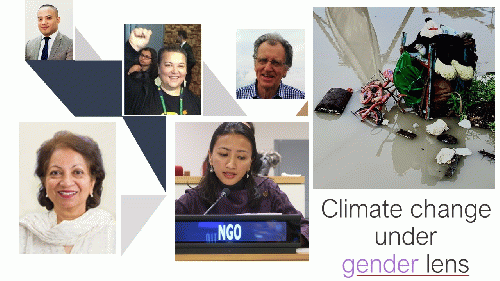Shobha Shukla - CNS
Countries in the Asia Pacific region are in the forefront of bearing the onslaught of climate change. During the last three decades 45% of the world's natural disasters have occurred in this region, which is vulnerable to floods, cyclones, earthquakes, droughts, storms and tsunamis.
While climate change affects everyone but impacts of climate change related events are not gender neutral. Women and girls are more vulnerable and disproportionately impacted due to pre-existing gender inequalities that are perpetuated by patriarchal beliefs. These inequalities are exacerbated during the times of disasters.
Biplabi Shrestha, Programme Director at the Asian-Pacific Resource and Research Centre for Women (ARROW), cites some of the gendered impacts of natural disasters as revealed by numerous studies done by ARROW: "In Bangladesh, even upon receiving early warning sirens women did not immediately seek refuge at cyclone shelters. Instead they stayed back to manage the household and to safeguard their assets and livestock. There is also the added burden within the households and girls drop out of school to help gather energy, food and water for the family. Early age marriage is used as a coping strategy in many poor communities in Bangladesh, Indonesia, Laos and Nepal, despite child marriage being legally banned in them. During any disaster, sexual and other forms of gender-based violence within family increases. Also, women and girls are more exposed to sexual violence in shelter camps. Gender ascribed rules and household food hierarchy systems existing in most communities lead to food insecurity and malnutrition of women and girls. It also prevents women and girls from accessing healthcare services, especially sexual and reproductive health services. As a result, maternal mortality rate goes up, and so do unwanted pregnancies, because of unmet need of contraception and lack of access to safe abortion."
Natural disasters adversely impact maternal health and uptake of family planning services. However two studies conducted by Population Council - one in Cambodia and another in Pakistan - show some very interesting results to the contrary.
A study on the 2013 massive floods in Cambodia, done by Dr Ashish Bajracharya, Deputy Director (global country strategy), Population Council, suggests that floods did not affect maternal health and family planning services uptake and outcomes, perhaps because flooding in Cambodia is endemic. So resilience and adaptation is likely high through years of experience. Also maternal health service seeking behaviours might particularly be inelastic to shocks.
Another study done by Dr Zeba Sathar, Country Director, Population Council, Pakistan, on the impact of 2010 floods in 3 districts of Pakistan found that women's involvement in both agricultural and non-agricultural work increased (as more men migrated in search of work) and they were forced to come out of complete 'purdah'. Their health-seeking behaviour and family planning use also improved in comparison to the dismal baseline figures. This could possibly be linked with greater exposure and access to health services provided by responding organizations.
In fact unmet need for family planning and maternal mortality ratio are two important indicators of the general status of sexual and reproductive health and rights (SRHR) across cultures in the region and give the scale of challenge in each country.
(Note: You can view every article as one long page if you sign up as an Advocate Member, or higher).






